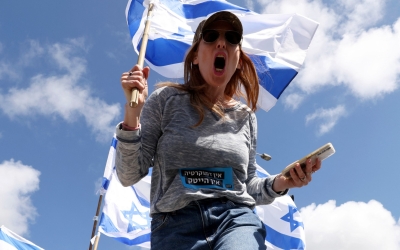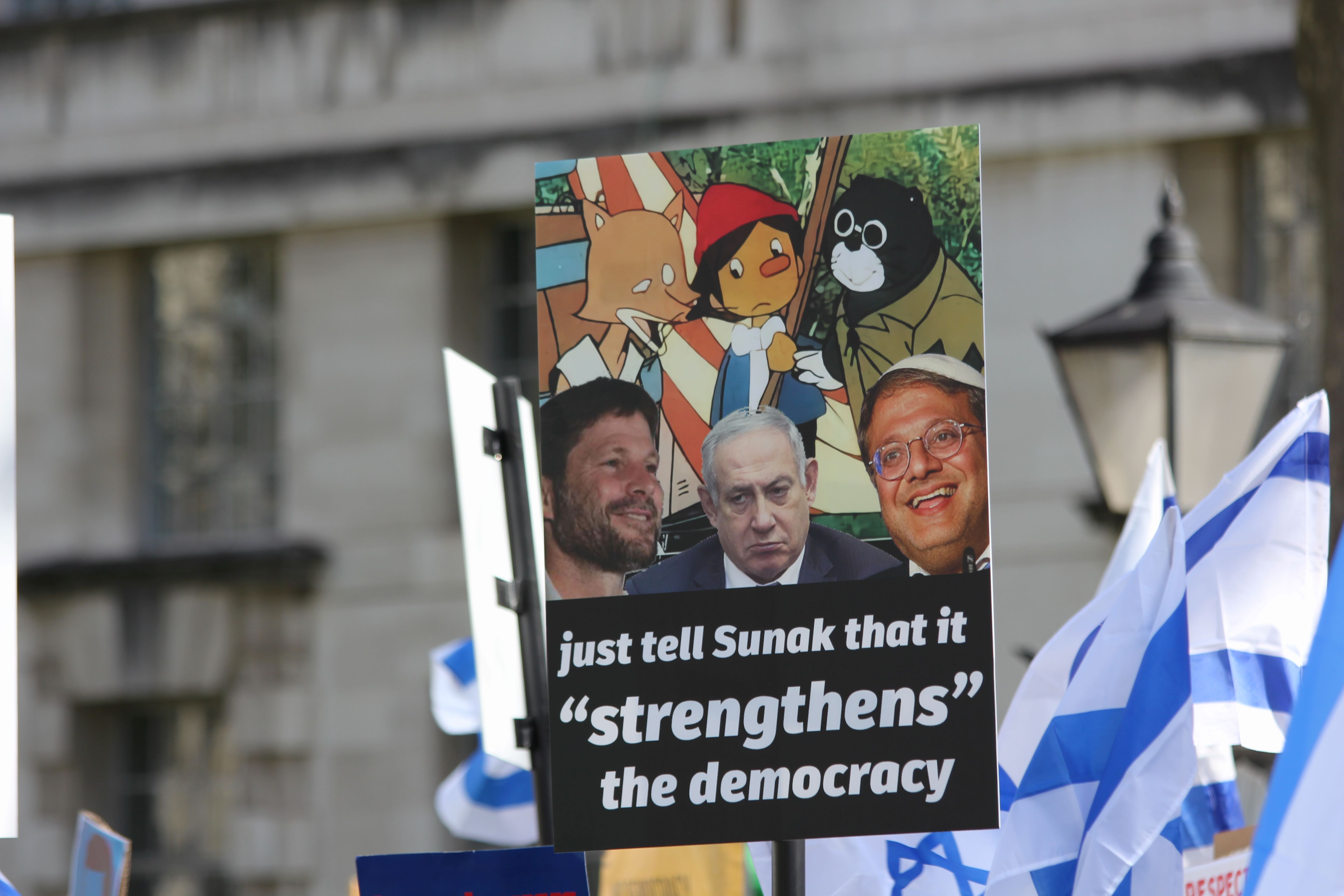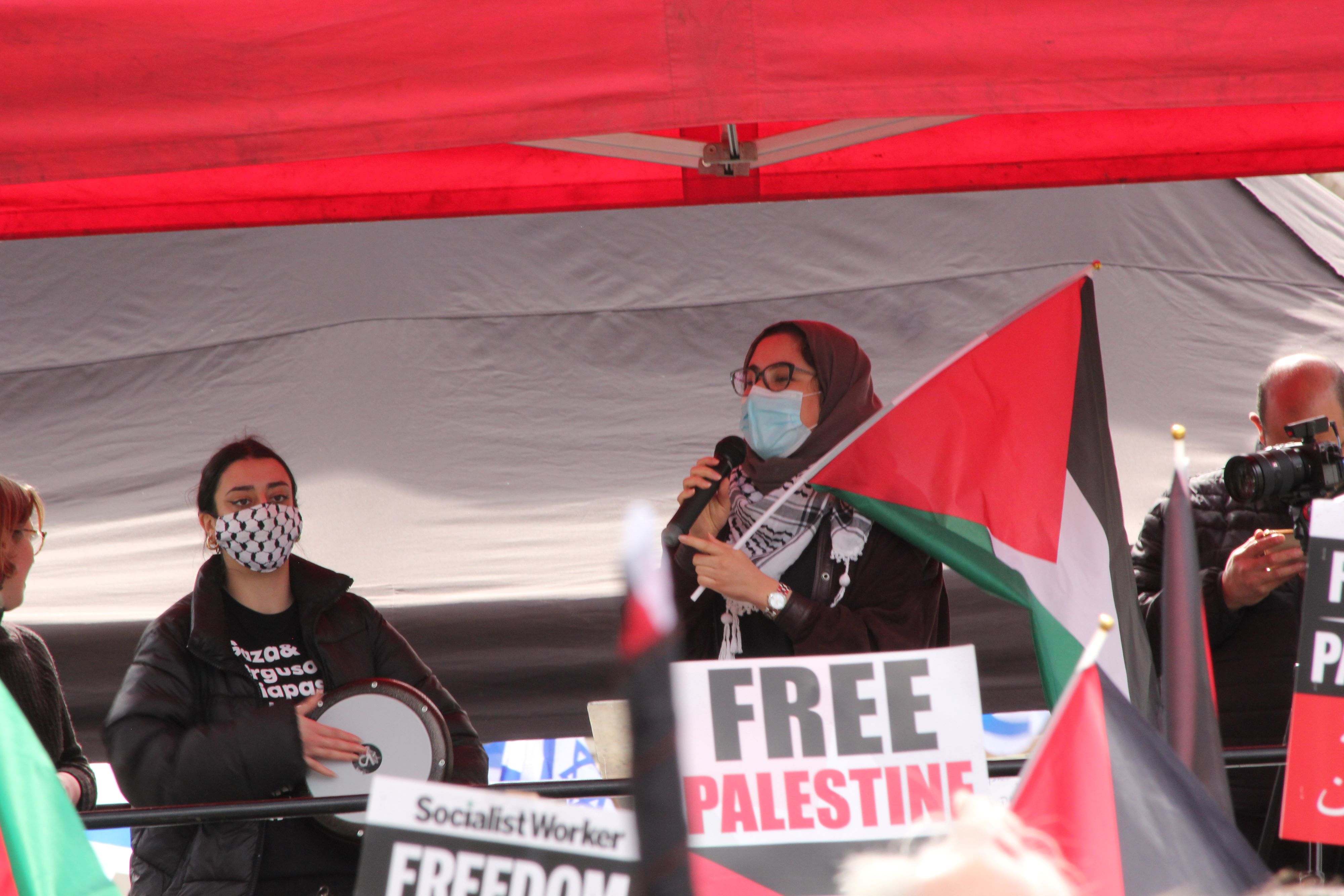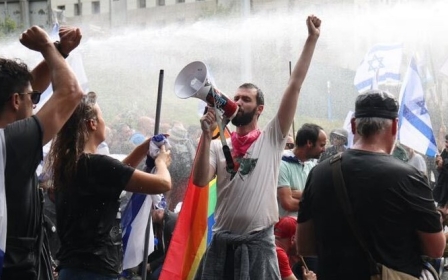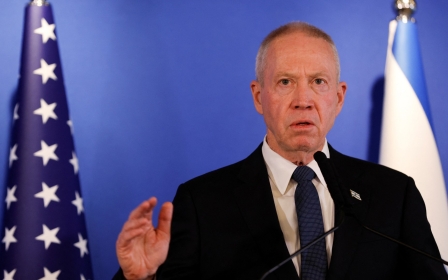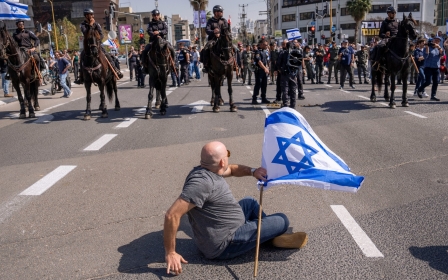Pro-Israel and Palestinian protests greet Netanyahu's visit to London
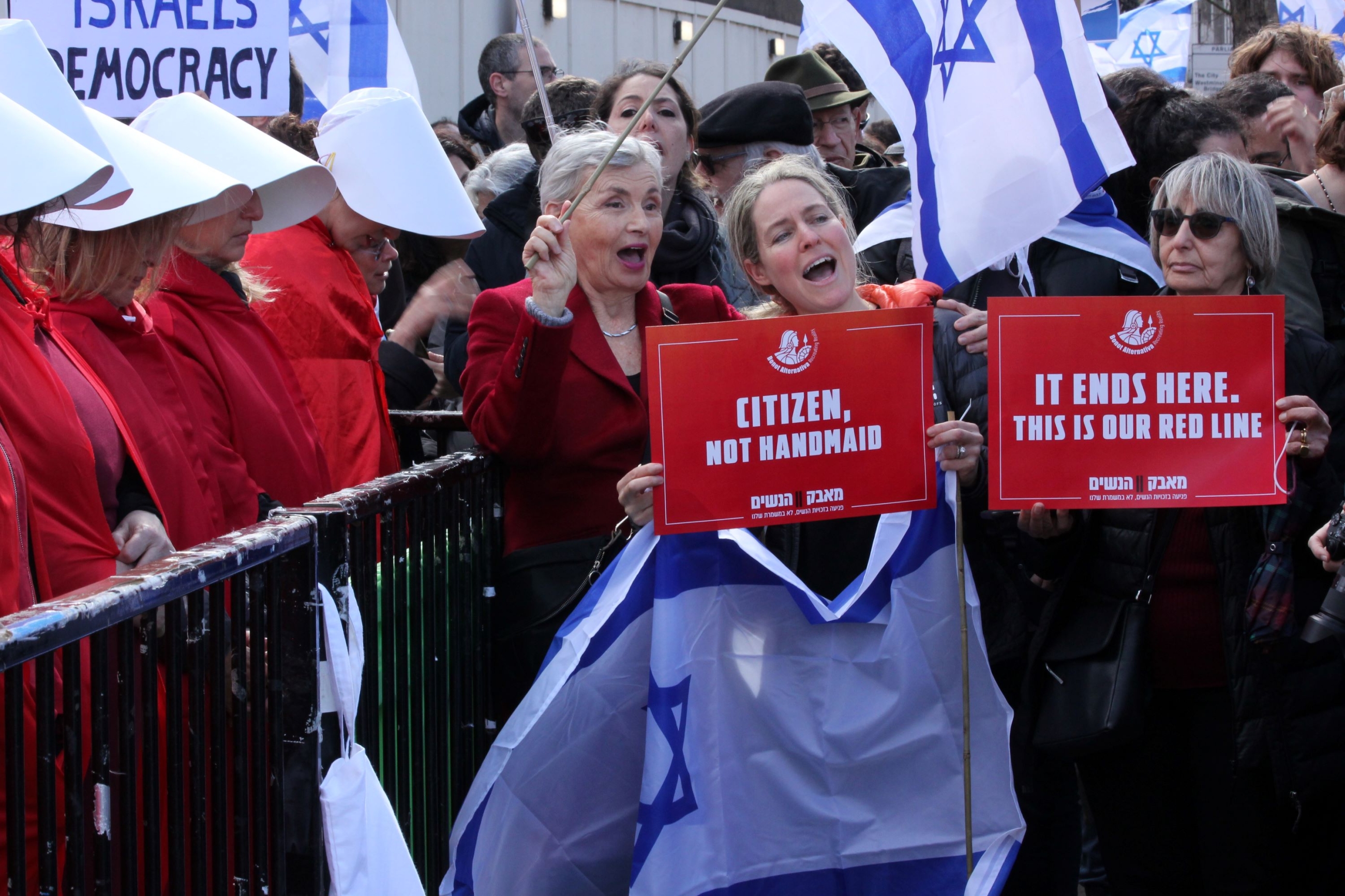
When Israeli Prime Minister Benjamin Netanyahu met with his UK counterpart in London on Friday he was greeted by protests organised by British Jewish and Israeli groups, as well as pro-Palestine activists.
Jeers and chants of "shame" could be heard as Netanyahu exited his vehicle and walked towards 10 Downing Street, where he shook hands with British Prime Minister Rishi Sunak.
New MEE newsletter: Jerusalem Dispatch
Sign up to get the latest insights and analysis on Israel-Palestine, alongside Turkey Unpacked and other MEE newsletters
Netanyahu was in the UK to discuss a wide range of issues, including security and the need to strengthen strategic ties between Britain and Israel.
The British prime minister raised the importance of upholding democratic values, including the proposed judicial overhaul in Israel, during the meeting, according to his office.
According to Axios journalist Barak Ravid, Sunak said he was "concerned about the negative implications" of the judicial overhaul and stressed the "democratic values that underpin our relationship."
Most of the protesters that had gathered in London appeared to be pro-Israel, waving Israeli flags and chanting slogans, including: "Netanyahu go to jail, you can’t speak for Israel".
Joe, an Israeli visiting London who joined the protests, told Middle East Eye: "They are trying to change the system in Israel," referring to the judicial overhaul planned by Netanyahu's far-right coalition government.
He described the London demonstration as "beautiful… everyone’s doing it from the heart".
The proposed judicial reforms would give parliament both the power to override Supreme Court decisions through a simple majority vote, and de facto control over court nominees, a role currently held by a mixed panel of politicians, judges, and bar association members.
It would also limit the court's ability to overturn unconstitutional legislation.
'Never was democracy in Israel'
Pro-Israel demonstrators in London were separated from pro-Palestine activists outside Downing Street by police.
Joe said he supported Palestinian demonstrators in principle, but suggested it may not be the best time to do it.
The pro-Palestine activists chanted "from the river to the sea, Palestine will be free" and "Netanyahu shame on you, Rishi Sunak shame on you," among other slogans.
One protester from the pro-Israel camp shouted "get fucked" in response to each call in the pro-Palestinian chants.
Haim Bresheeth, an activist from the Jewish Network for Palestine, told MEE that he felt that the anti-Netanyahu protesters did not go far enough.
"I am against Zionism, I am against Netanyahu, I am against racism, against everything that the Israeli government has been doing since 1948," he told MEE.
"I am not with those people," Bresheeth said, gesturing over at the pro-Israeli demonstrators. "They are talking about Israeli democracy - there never was democracy in Israel."
'They are talking about Israeli democracy - there never was democracy in Israel'
- Haim Bresheeth, Jewish Network for Palestine
"Netanyahu is the most extreme example of the lack of democracy that now even Jews understand, it's not for them either."
Referring to the pro-Israeli demonstrators, he added: "They are speaking against Netanyahu but they don't understand they need to speak against the occupation."
Another Israeli protester, holding up a placard by Na’amod, a British Jewish organisation that campaigns against the occupation of Palestinian land, said that her feelings lay somewhere in between both demonstrations.
"I think democracy has been in a bad state for a while, discriminating against a lot of minority groups," she said, adding it was the "last stand for democracy".
On Thursday, Israelis marched for the 11th week in a row as part of nationwide protests aimed at stopping what many believe is a judicial coup.
Addressing protesters in London from a platform, Ben Jamal, director of the UK-based Palestinian Solidarity Campaign, said: "They are demonstrating because they believe the Netanyahu government is threatening democracy in Israel.
"We are here to assert this truth: Israel has never been a democracy for Palestinians, not once in its 75-year existence."
As rain began to gather towards midday, a small group of pro-Netanyahu protesters appeared opposite the other two demonstrations. They held placards welcoming Netanyahu to Britain and sang Hava Nagila.
"We're here to welcome the democratically elected prime minister of Israel," said Jonathan Hoffman, one of the protesters, who said they were composed of British Jews and British Christians.
He said he supported the judicial reforms being pushed by Netanyahu, adding he was not convinced by the arguments given by the anti-Netanyahu demonstrators.
"They don't support Bibi Netanyahu, they failed to push him out in the elections and they're trying to fight the elections by other means.
"In Israel the supreme court has enormous power, it can do anything, unlike the supreme court in the UK, unlike the supreme court in America, it can actually strike down legislation...all that the reforms seek to do is restore the balance between unelected judges and elected politicians."
UK and Israel sign pact
UK broadcasters were expected to be allowed to film the start of Sunak and Netanyahu's meeting, but that appeared to have been cancelled on Friday morning.
Netanyahu's visit to London comes just three days after the UK government signed a strategic partnership with Israel, aimed at deepening "economic, security, and technology ties" between the two countries and tackling the "scourge of antisemitism".
As part of the pact, the UK agreed to oppose the use of the term "apartheid" to describe Israel’s treatment of Palestinians and pledged to confront "anti-Israel bias" in international institutions, including the United Nations.
Activists and international human rights groups described the agreement as "hypocritical" and "disappointing but not surprising".
"The UK is once again on the wrong side of history, revealing its lack of credibility with respect to human rights," Nimer Sultany, a reader in public law at the School of Oriental and African Studies, University of London, told MEE on Thursday.
"This deal indicates that no matter how grave are Israel’s violations of basic rules of international law and human decency, such as the prohibition on apartheid, it will continue to enjoy British backing to enable impunity."
Middle East Eye delivers independent and unrivalled coverage and analysis of the Middle East, North Africa and beyond. To learn more about republishing this content and the associated fees, please fill out this form. More about MEE can be found here.


